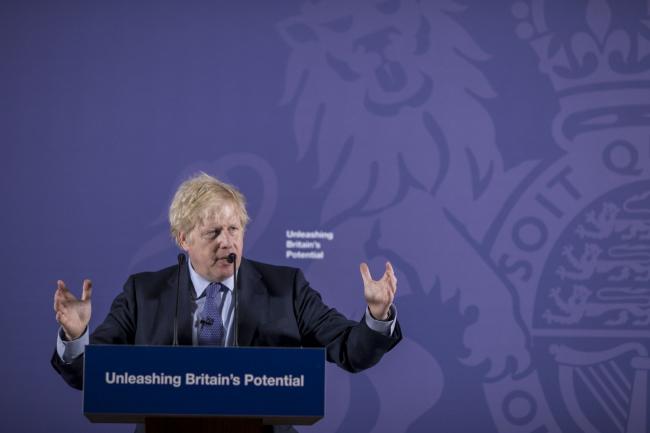(Bloomberg) -- There are few relationships in the U.K. government more important -- or potentially more toxic -- than the partnership between the prime minister and the chancellor of the exchequer.
On Thursday that crucial double-act spectacularly broke apart when Boris Johnsonmoved to take full control over the finance ministry and his chancellor, Sajid Javid, resigned in protest.
Johnson’s power grab was the latest and most dramatic example of his drive to impose his authority on every aspect of government and political debate in Britain. He quickly replaced Javid with the inexperienced Rishi Sunak, who has never run a government department and has only been a member of parliament for five years.
Boris Johnson Ambushed His Chancellor in a Quest for Control
The premier’s aides say his goal is simple: to take total control over economic policy, bringing the troublesome Treasury into line, and ensuring there are no more clashes or feuds between the two most powerful ministers in the government. The question now is, will it work?
Creative Tension
The relationship between between the prime minister’s office at Number 10 Downing Street and the chancellor’s next door has been central to the success of British governments for decades, and Johnson’s move risks taking the U.K. into territory uncharted in modern times.
It is a partnership frequently defined by tension. But even on the rare occasions when the two post-holders have got on, the dynamic between them has ensured policy makers’ flights of fancy, and urge to spend money, are tethered to earth by reminders of their fiscal responsibilities.
“The role of the Treasury is to challenge, and you need that bit of grit,” said Jill Rutter a former senior Treasury official who now works for the Institute for Government, a think-tank. “If one of the purposes is to remove any sense of that challenge, then that’s not a good idea. Taxpayers and policy suffer if you make the Treasury a fully subordinated unit of Number 10.”
U.K. Political Shock Opens the Door to Trump-Style Stimulus
Johnson was 25 in 1989, when Nigel Lawson quit as chancellor after falling-out with Margaret Thatcher because she was paying more heed to her own economic aide than to him. There have been running battles between the Treasury and the prime minister’s office for most of Johnson’s adult life.
Watching Blair
He was a backbench MP watching from the sidelines as Tony Blair and Gordon Brown fought their way through the first decade of the 21st century and it’s not hard to see how the prime minister, freshly elected with a commanding majority, would want to stop the same thing happening to him.
“It didn’t work well having the Treasury going in a very different direction from the center of government,” Jonathan Powell, Blair’s chief of staff, told BBC Radio on Friday. But “to do what they’ve done now I think is a mistake,” he said. Sunak is “clearly completely subservient to the prime minister and to his special advisers” and won’t provide enough challenge, said Powell.
Johnson’s aides say he wants his relationship with the Treasury to replicate that of David Cameron and George Osborne, who worked closely together from 2010 to 2016. But even their relationship was marked by disagreements, some of which were precipitated by five years sharing power and having to find common cause with the Liberal Democrats in coalition.
The other key difference is that Osborne and Cameron were close friends and political equals. Johnson, who has been at the forefront of British politics for two decades, dwarfs his new chancellor in terms of stature and power.
Johnson’s Stooge?
The test will come when Sunak needs to assert his independence as the new chancellor. He may have an advantage compared to Javid, not least because Johnson will not want to lose a second chancellor, according to David Gauke, who was a Treasury minister in Theresa May’s government.
“If Rishi simply ends up being seen as a stooge of the prime minister then that won’t help,” Gauke said in an interview. “I wouldn’t be surprised if at some point he wants to demonstrate his independence.”
After his shock resignation on Thursday, Javid fired a warning shot to Johnson. The power grab could backfire on the premier and undermine the credibility of the British government, he said in his resignation letter. The chancellor must be able to take candid and independent advice from his aides, Javid warned.
“If the Treasury ends up being to a degree neutered and having its function as custodian of public finances curtailed, then that would be deeply problematic.” said Mel Stride, a former minister who now chairs parliament’s Treasury committee. He added that “a joined-up approach between the two offices could be a very good thing.”
Too Strong
At stake in all this is the future of Britain’s economy as the country searches for a new role in the world after leaving the European Union. A fiscally incontinent government could hurt the taxpayer, the government’s ability for policy making and striking trade deals with other countries. If the gamble doesn’t pay off, it could cost Johnson his premiership at the next election.
For now, Number 10 officials insist the new unit, bringing together Treasury and Downing Street economic advisers into a single team, will ensure the chancellor and prime minister are aligned on key policies. It will include existing officials from Number 10 including Liam Booth-Smith and Douglas McNeill, according to one official.
But history has shown that even the most powerful prime ministers sometimes need a skeptical chancellor who can stand up for himself. If Johnson’s gamble goes wrong, too much power could be his -- and the economy’s -- undoing.
